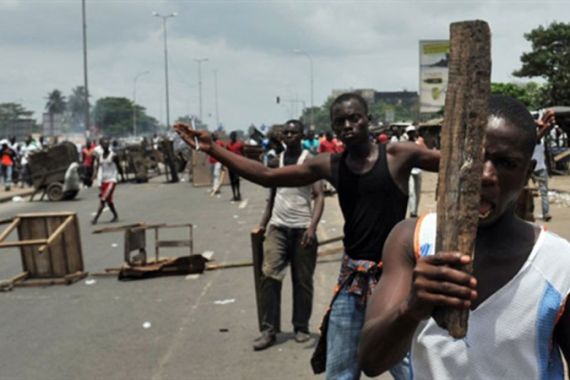Ivorian women fatally shot at rally
Six killed by forces loyal to country’s disputed president at demonstration in support of his rival, witnesses say.

Cote d’Ivoire’s UN ambassador, appointed by Ouattara, describes the current unrest as ‘ethnic cleansing’
Security forces loyal to Laurent Gbagbo, Cote d’Ivoire’s disputed president, have shot dead at least six women at a demonstration in support of his rival, Alassane Ouattara, witnesses said.
Thursday’s shooting took place after several hundred women gathered in the Abobo neighbourhood of Abidjan, the country’s commercial capital, shouting “Gbagbo, get out!” and “Alassane for president”, a resident told the AFP news agency.
Mohamed Dosso, an assistant to the mayor of Abobo, said an armoured personnel carrier and several pickup vehicles showed up as the women were protesting and opened fire.
Sirah Drane, 41, who helped organise the march, said she was holding a megaphone, preparing to address the large crowd, when she saw tanks arriving.
“There were thousands of women,” she said. “And we said to ourselves, ‘They won’t shoot at women.’ … I heard a boom. They started spraying us. … I tried to run and fell down. The others trampled me. Opening fire on unarmed women? It’s inconceivable.”
The attack prompted an immediate rebuke from the US, which like most governments has urged Gbagbo to step down and has recognised his rival as the country’s legitimate president.
“The moral bankruptcy of Laurent Gbagbo is evident as his security forces killed women protesters,” PJ Crowley, the US state department spokesman, said in a Twitter message.
Street fighting
The UN has said more than 200,000 people have fled Abobo amid days of heavy street fighting between police loyal to Gbagbo and rebel soldiers allied with Ouattara.
The UN’s refugee agency has expressed alarm about the dire conditions facing people trying to get out of the area, citing “reports of many dead bodies, buses burned and shops looted, and of young militiamen attacking people inside their homes”.
Gbagbo has cut power and water supplies to the country’s north, under the control of rebels, which might fuel a humanitarian crisis, a UN spokesperson in Cote d’Ivoire has confirmed.
Kristen Saloomey, Al Jazeera’s correspondent in New York, said that the UN has handed out 14,000 litres of drinkable water in the affected area, which is controlled by Ouattara supporters.
In New York, the UN Security Council said it is “deeply concerned” about the escalation of violence in Cote d’Ivoire and that it could lead to a resurgence of civil war there.
Cote d’Ivoire has been in turmoil since Gbagbo refused to cede power in October last year after Ouattara was internationally recognised to have won the presidential election.
The standoff reached a new level last week after forces loyal to Gbagbo began using deadly weapons, including mortars and rocket-propelled grenades.
The post-election violence has claimed the lives of hundreds of people.
North-south divide
Cote d’Ivoire was officially reunited in a 2007 peace deal, after the 2002-2003 civil war had divided the country into a rebel-controlled north and a south loyal to the government.
Last year’s election renewed divisions between the two regions.
Ouattara still draws his support from the northern half of the country, where many residents complain of being treated as foreigners within their own country by southerners.
Youssoufou Bamba, the country’s ambassador to the UN, appointed by Ouattara, told Al Jazeera that people of northern origin and from the central region were now being targeted in the violence and “fear for their life”.
He said the UN mission in the cannot fulfil its mandate to protect civilians
“Supporters of Gbagbo are preventing the peacekeepers from doing their jobs and worse, they’re being targeted as well.”
Multiple delegations of African leaders have failed to persuade Gbagbo to leave office, with the president rejecting all of their proposals, including offers of an amnesty and exile abroad.
Meanwhile, the UN has apologised to Belarus after it falsely accused it of breaking an arms embargo against Cote d’Ivoire.
A UN official admitted it had wrongly alleged the country had illegally shipped attack helicopters to the Gbagbo-led government.
The office of Ban Ki-moon, the UN secretary-general, had made the charge in a statement on Monday, saying the “first delivery arrived reportedly” in “a serious violation of the embargo against Cote d’Ivoire which has been in place since 2004”.